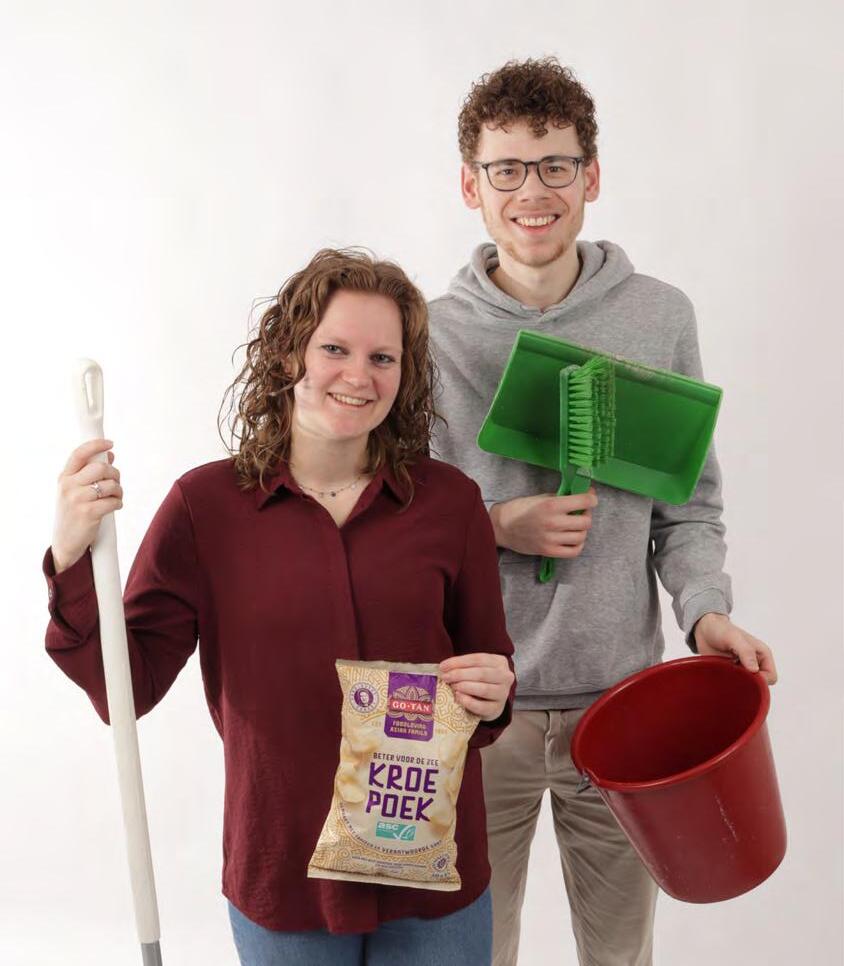

Next food waves

Popeyes protein / ontkleuren van spinazie eiwitten
Production & Technology
Popeyes protein / ontkleuren van spinazie eiwitten
Uitdaging
In de huidige voedingssector is de markt ingericht op neutraal gekleurde, multiinzetbare eiwitproducten van plantaardige basis. Hieraan kan spinazie-eiwit, door zijn groene kleur, niet bijdragen.
Oplossing
Door op pilotschaal een theoretisch ontkleuringsproces te ontwikkelen kan een multi-inzetbaar, neutraal gekleurd eiwitproduct gemaakt worden uit spinaziebladeren.
Challenge Solution
In the current food industry, the market is geared towards neutral coloured, multipurpose protein products of plant-based origin. Due to its green color, spinach protein cannot contribute to this.
By developing a theoretical decolourisation process on a pilot scale, a multi-purpose, neutrally coloured protein product can be created from spinach leaves.
Naam
Opleiding
Contact
Anthony Burger, Laura de Kock, Teun Smulders
Food Technology
A.burger@student.has.nl

Production & Technology

ReFaba
Uitdaging
Het huidige extractieproces voor het winnen van polyfenolen uit veldboonreststromen is inefficiënt en ontoereikend voor rendabele en duurzame productie. Een efficiënter en milieuvriendelijker proces is essentieel om de volledige waarde van de polyfenolen voor cosmetische toepassingen te benutten en de reststromen optimaal te gebruiken.
Oplossing
ReFaba zet veldbonenreststromen om in duurzame extracten voor de cosmetische industrie via een geoptimaliseerd en milieuvriendelijker proces, waarmee we de volledige reststroomwaarde benutten. Door bioactieve componenten, zoals polyfenolen, te extraheren, creëren we antioxidanten die de effectiviteit van huidverzorgingsproducten verbeteren.
Challenge Solution
The current extraction process for obtaining polyphenols from faba bean by-products is inefficient and insufficient for profitable and sustainable production. A more efficient and environmentally friendly process is essential to fully harness the value of polyphenols for cosmetic applications and to optimise the use of these by-products.
ReFaba transforms faba bean byproducts into sustainable extracts for the cosmetics industry through an optimised and more environmentally friendly process, maximising the full value of the by-products. By extracting bioactive components, such as polyphenols, we create antioxidants that enhance the effectiveness of skincare products.
Naam
Opleiding
Contact Huub van Overdijk, Sabine van den Berg, Lana Swinkels, Tijn van der Linden, Petry van Noordenburg
Food Technology
Huubvanoverdijk@hotmail.com, Sabine.vandenberg@onsmail.nl, Lanaswinkels@outlook.com, Tijnvdlinden2001@hotmail.com, Petry_v_noordenburg@hotmail.com

Production
& Technology

Optimalisatie schoonmaakproces frituurlijn
Production & Technology
Optimalisatie schoonmaakproces frituurlijn
Uitdaging
Het huidige schoonmaakproces van de frituurlijn bij Go-Tan is tijdrovend, wat leidt tot hoge kosten. Daarom is onderzocht of het schoonmaakproces efficiënter en geoptimaliseerd kan worden.
Oplossing
Het onderzoek heeft de knelpunten in het huidige schoonmaakproces geïdentificeerd en geëvalueerd. Op basis hiervan is een geoptimaliseerd schoonmaakproces ontwikkeld, wat heeft geleid tot een verbeterde efficiëntie en lagere kosten.
Challenge Solution
The current cleaning process of the fry line at Go-Tan is time-consuming, resulting in high costs. Therefore, research was conducted to determine whether the cleaning process could be made more efficient and optimised.
The research has identified and evaluated the bottlenecks in the current cleaning process. Based on this, an optimised cleaning process has been developed, resulting in improved efficiency and lower costs.
Naam
Opleiding
Contact Kim Veltman, Joep Gellings
Food Technology kim.veltman@xs4all.nl, Joep.gellings@gmail.com

Production & Technology

PAL-wetgeving
Uitdaging
Vanaf 2026 geldt een nieuw allergenenbeleid, waarbij de zin ‘kan sporen bevatten van’ niet zomaar op de verpakking mag staan. Momenteel wordt deze zin wel gebruikt, zonder dat aan de nieuwe regelgeving wordt voldaan. Het is daarom van cruciaal belang om te onderzoeken hoe aan dit beleid kan worden voldaan.
Oplossing
Door middel van observaties wordt gecontroleerd of de huidige allergenenprocedure kruisbesmetting effectief voorkomt. Dit wordt ondersteund door herhaalde allergeentests, die inzicht geven in de effectiviteit van de gedocumenteerde reinigingsstappen.
Als laatste wordt de VITAL-berekening toegepast om het daadwerkelijke risico in kaart te brengen.
Challenge Solution
Starting in 2026, new allergen regulations will come into effect, prohibiting the phrase ‘may contain traces of’ from being casually used on packaging. Currently, this phrase is still being used without complying with the new regulations. It is therefore crucial to investigate how to meet these new requirements.
Through observations, it is assessed whether the current allergen procedures effectively prevent cross-contamination. This is supported by repeated allergen tests, which provide insight into the effectiveness of the documented cleaning steps. Finally, the VITAL calculation is applied to accurately map the actual risk.
Naam
Opleiding
Contact

Lotte Swart, Emma Gradussen, Yasmin de Rooij
Food Technology
l.swart@student.has.nl, e.gradussen@student.has.nl, y.derooij@student.has.nl
Production & Technology

Duurzame procesinnovaties voor wortel en gember
Uitdaging
De fictieve opdrachtgever Zanahoria, een start-up in de voedingsmiddelenindustrie, wil inspelen op de groeiende vraag naar gezonde en duurzame producten. Hierbij zijn procestechnologen van de HAS green academy ingeschakeld om lucratieve productieprocessen te ontwikkelen voor wortel-gemberproducten met het oog op duurzaamheid en kwaliteit.
Oplossing
Het team van procestechnologen heeft een adviesrapport opgesteld waarin verschillende procesopties voor diverse eindproducten (wortel-gembersap, -concentraat en poeder) theoretisch zijn onderzocht. Deze opties zijn vergeleken in een criteriamatrix, waar onder andere investeringskosten, productiecapaciteit en duurzaamheid vergeleken worden.
Challenge Solution
The fictitious client Zanahoria, a start-up in the food industry, wants to respond to the growing demand for healthy and sustainable products. For this purpose, a team of process technologists from HAS green academy have been tasked with developing lucrative production processes for carrot-ginger products, with an eye on sustainability and quality.
The team of process technologists has prepared an advisory report in which various process options for different end products (carrot-ginger juice, concentrate and powder) have been theoretically analysed. These options are compared in a criteria matrix, evaluating factors such as investment costs, production capacity and sustainability.
Naam
Opleiding
Contact Marjorie Dalhuisen, Teun van den Elzen, Louisban Jagt, Jedidja van der Perk
Food Technology
M.Dalhuisen@student.has.nl, T.vandenElzen@student.has.nl, L.Jagt@student.has.nl, J.vanderperk@student.has.nl

Production & Technology








